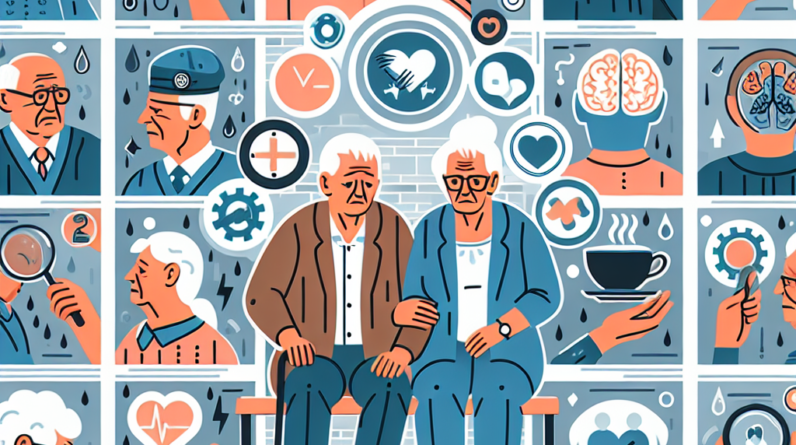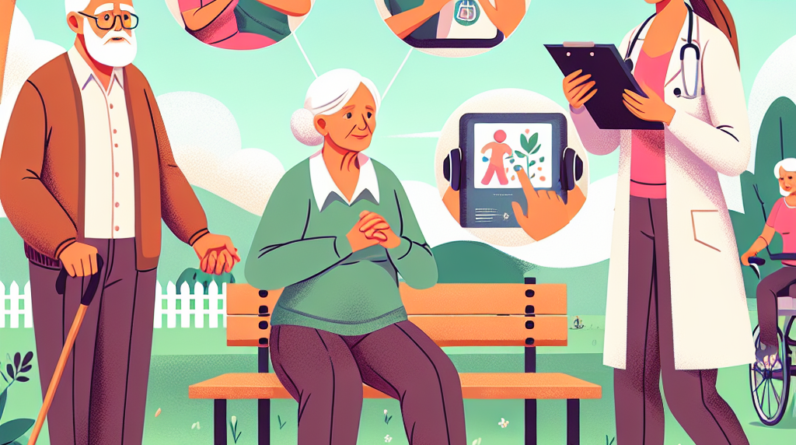
As you gracefully navigate through the different stages of life, it becomes essential to prioritize mental well-being, and this is particularly true as it pertains to the process of aging. The intricate connection between mental health and aging requires careful consideration, and in this article, we explore the various aspects of mental health aging. By shedding light on this subject, we hope to provide you with valuable insights into the challenges, potential solutions, and resources available to enhance and maintain your mental well-being during this unique phase of life.

Understanding Mental Health Aging
Significance of Mental Health in Aging
As you age, taking care of your mental health becomes increasingly important. Mental health plays a significant role in overall well-being and quality of life in older adults. It affects numerous aspects of daily functioning, including the ability to perform daily activities, maintain relationships, and enjoy life to the fullest. Neglecting mental health can lead to various challenges and complications that can significantly impact the aging process. Therefore, understanding and addressing mental health concerns in older adults is crucial for promoting healthy aging.
Common Mental Health Conditions in Older Adults
Older adults are susceptible to a range of mental health conditions, some of which become more prevalent with age. One common condition is depression, which can manifest differently in older adults compared to younger populations. Older adults may experience persistent sadness, a loss of interest in activities, difficulty sleeping, changes in appetite, or physical symptoms such as aches and pains.
Another common condition is anxiety, which can be related to various life changes and health concerns that older adults face. Anxiety can manifest as excessive worry, restlessness, difficulty concentrating, or physical symptoms like a racing heart or shortness of breath.
Additionally, older adults may experience cognitive disorders such as Alzheimer’s disease and other forms of dementia. These conditions can significantly impact memory, thinking, and daily functioning.
Challenges in Diagnosing Mental Health Issues in Older Adults
Diagnosing mental health issues in older adults presents unique challenges. The symptoms of mental health conditions can often overlap with or mimic those of physical health conditions. For example, cognitive decline may be mistaken for normal signs of aging or attributed to other medical conditions. This can delay or complicate the diagnosis of mental health issues.
Furthermore, older adults may be less likely to seek help or disclose their mental health concerns due to a stigma surrounding mental illness. They may also have difficulty expressing their emotions or may attribute their symptoms to physical ailments. Healthcare professionals must be vigilant in recognizing the signs of mental health issues in older adults and providing appropriate support and care.
Factors Influencing Mental Health in Older Adults
Physical Health and Aging
Physical health has a significant impact on mental health in older adults. Chronic health conditions, such as heart disease, diabetes, or arthritis, can contribute to the development or exacerbation of mental health issues. The management of physical health conditions, including pain and discomfort, can also influence mental well-being. Therefore, it is essential to prioritize holistic care that considers both physical and mental health in older adults.
Social Isolation and Loneliness
Social connectedness is vital for mental health, regardless of age. However, older adults may face unique challenges in maintaining social connections, such as retirement, loss of loved ones, or limited mobility. Social isolation and loneliness can contribute to depression, anxiety, and cognitive decline in older adults. Creating opportunities for social engagement, such as community programs or support groups, can help combat social isolation and promote mental well-being.
Cognitive Changes and Dementia
Cognitive changes are a normal part of the aging process. However, severe cognitive decline, as seen in dementia, can significantly impact mental health. Dementia can lead to feelings of frustration, confusion, and disorientation, causing distress and impairing overall well-being. Early detection and intervention are crucial for managing cognitive changes and providing appropriate support for individuals affected by dementia.
Loss and Grief
As people age, they may experience multiple losses, such as the death of loved ones, retirement, or a decline in physical abilities. These losses can trigger feelings of grief and sadness, which, if left unaddressed, can lead to mental health issues. Providing adequate support and resources for older adults to cope with loss and grief is essential for maintaining their mental well-being.
Stress and Coping Mechanisms
Life changes and stressors can have a significant impact on mental health in older adults. Adjusting to retirement, financial concerns, or health issues can create significant stress. It is crucial for older adults to develop healthy coping mechanisms to manage stress effectively. Engaging in relaxation techniques, spending time with loved ones, or seeking professional support can help older adults navigate through stressful periods and maintain good mental health.
The Impact of Mental Health on Aging
Physical Health Effects
Mental health has a profound impact on physical health in older adults. Mental health conditions, such as depression and anxiety, can contribute to the development or worsening of physical health problems. For example, chronic stress and anxiety can raise blood pressure, weaken the immune system, and increase the risk of cardiovascular disease. Conversely, taking care of mental health can improve physical well-being and longevity.
Quality of Life and Functional Impairment
Mental health directly influences the quality of life and functional abilities of older adults. Mental health issues can impact daily functioning, leading to difficulties in performing activities of daily living, managing self-care, or maintaining independence. By addressing mental health concerns and promoting positive mental well-being, older adults can improve their quality of life and maintain a higher level of functioning.
Relationships and Social Support
Mental health plays a crucial role in maintaining healthy relationships and social connections. Poor mental health can strain relationships, isolate individuals, and impact social interactions. Conversely, positive mental health contributes to the maintenance of meaningful relationships and the cultivation of a strong support network. Nurturing social connections and seeking support from loved ones can have a significant positive impact on mental health and aging.
Preventing and Managing Mental Health Issues in Older Adults
Promoting Positive Mental Health and Well-being
Promoting positive mental health in older adults is essential for preventing mental health issues. Encouraging activities that promote well-being, such as regular exercise, engaging hobbies, or practicing mindfulness, can contribute to positive mental and emotional states. Additionally, promoting a positive attitude towards aging and resilience in the face of challenges can help older adults maintain good mental health.
Identifying and Addressing Risk Factors
Identifying and addressing risk factors for mental health issues is crucial for preventing and managing these conditions in older adults. Risk factors may include a history of mental illness, chronic health conditions, social isolation, or recent life changes. By identifying and addressing these risk factors through interventions and support, healthcare professionals can mitigate mental health issues in older adults.
Building Strong Support Networks
Building a strong support network is essential for older adults’ mental health. Encouraging the cultivation of relationships with family, friends, or community organizations can help prevent social isolation and provide emotional support. Support networks can also help older adults navigate through life changes and challenges, reducing the risk of mental health issues.
Effective Treatment Approaches
When mental health issues arise in older adults, effective treatment approaches are necessary for management and support. These approaches may include psychotherapy, medication management, or a combination of both. Age-appropriate treatment plans that consider the specific needs and limitations of older adults can help alleviate symptoms and improve mental well-being.

Improving Access to Mental Health Care for Older Adults
Addressing Barriers to Mental Health Services
Access to mental health care can be a significant barrier for older adults. Structural and systemic barriers, such as limited transportation, financial constraints, or lack of specialized geriatric mental health services, can hinder older adults’ access to care. Addressing these barriers requires policy changes, increasing funding for mental health services, and expanding the availability of specialized care for older adults.
Enhancing Geriatric Mental Health Programs
Enhancing geriatric mental health programs is crucial for improving access and effectiveness of care for older adults. These programs should focus on training healthcare professionals in geriatric mental health, increasing the availability of specialized services, and promoting collaboration between geriatric healthcare providers and mental health specialists. By improving the quality and availability of geriatric mental health programs, older adults can receive the care and support they need.
Integrating Mental Health Services into Primary Care
Integrating mental health services into primary care settings can help older adults access mental health care more easily. Many older adults rely primarily on primary care providers for their healthcare needs, making it a convenient and accessible platform to address mental health concerns. By integrating mental health services into primary care settings, older adults can receive comprehensive care that considers their physical and mental health.
Training Healthcare Professionals
Training healthcare professionals in geriatric mental health is vital for improving care for older adults. Healthcare providers need to be equipped with the knowledge and skills to recognize and address mental health issues in older adults effectively. Ongoing education and training programs can enhance healthcare professionals’ ability to provide age-appropriate and person-centered care for older adults with mental health concerns.
Strategies for Supporting Mental Health in Aging
Encouraging Healthy Lifestyle Choices
Encouraging healthy lifestyle choices is an effective way to support mental health in older adults. Regular physical exercise, a balanced diet, and adequate sleep contribute to overall well-being and can help prevent and manage mental health issues. Additionally, avoiding excessive alcohol consumption, quitting smoking, and managing stress can have a positive impact on mental health.
Providing Age-Friendly Environments
Creating age-friendly environments that promote mental well-being is essential for older adults. These environments should consider physical accessibility, safety, and opportunities for social engagement. Community organizations, healthcare settings, and residential facilities can work together to provide age-friendly spaces that support mental health in aging.
Promoting Social Participation
Promoting social participation is crucial for supporting mental health in older adults. Community programs, senior centers, and volunteer opportunities can provide avenues for social engagement, reducing social isolation and loneliness. Encouraging older adults to participate in activities that align with their interests and promote social connections fosters a sense of belonging and well-being.
Supporting Caregivers
Supporting caregivers is essential for maintaining the mental health of older adults. Informal caregivers, such as family members or friends, play a crucial role in providing care and support for older adults. Ensuring caregivers have access to respite care, support groups, or mental health services can help prevent caregiver burnout and promote a positive caregiving environment.
Role of Technology in Mental Health Aging
Digital Mental Health Interventions
Technology plays a significant role in supporting mental health in aging. Digital mental health interventions, such as smartphone applications or online therapy programs, provide convenient and accessible options for older adults to receive mental health support. These interventions can help address barriers to care, increase engagement, and promote self-management of mental health.
Telemedicine and Remote Monitoring
Telemedicine and remote monitoring have revolutionized healthcare delivery, including mental health care. Older adults can now receive mental health evaluations, consultations, and follow-ups through video conferencing or remote monitoring devices. This technology improves access to care, particularly for individuals who have mobility limitations or live in rural areas.
Technological Support for Older Adults
Various technological innovations cater specifically to the needs of older adults and support their mental health. Examples include wearable health devices that track physical activity and sleep patterns, medication reminder apps, or cognitive training programs designed to stimulate mental abilities. Technological support enhances independence, self-management, and mental well-being in older adults.
Cultural Considerations in Mental Health Aging
Diverse Perspectives on Aging and Mental Health
Cultural diversity influences perspectives on aging and mental health. Different cultural backgrounds may have unique beliefs, values, and attitudes towards mental health. Understanding and respecting these diverse perspectives is crucial for providing culturally competent care to older adults. Healthcare professionals should engage in cultural humility, actively seeking to understand and address the specific needs of older adults from different cultural backgrounds.
Cultural Competence in Healthcare
Cultural competence in healthcare involves understanding and integrating cultural beliefs, values, and practices into care delivery. This approach ensures that care is respectful, relevant, and effective for the individual receiving it. By considering cultural factors and tailoring interventions accordingly, healthcare professionals can promote better mental health outcomes in older adults across diverse cultural backgrounds.
Overcoming Stigma and Discrimination
Stigma and discrimination surrounding mental health are prevalent across different cultures and can act as a barrier to seeking help. Addressing stigma and discrimination requires community education and awareness campaigns that challenge negative stereotypes and promote understanding and acceptance. Creating safe spaces that encourage open discussions about mental health and aging can help reduce stigma and improve access to care for older adults.
Research and Future Directions
Advancing Geriatric Mental Health Research
Continued research is crucial for advancing the field of geriatric mental health and improving mental health outcomes in older adults. Research can help identify effective interventions, understand the impact of social determinants on mental health, and inform policy changes. By investing in research, we can continually improve the understanding and treatment of mental health issues in aging adults.
Promoting Policy Changes
Policy changes are necessary to improve mental health care for older adults. Advocating for increased funding, expanding access to specialized care, and integrating mental health services into existing healthcare systems are important steps towards improving mental health outcomes. By influencing policy changes, we can create more supportive environments for older adults and promote their mental well-being.
Innovations in Care Models
Innovations in care models are essential for meeting the unique needs of older adults with mental health concerns. Person-centered and integrated care models that consider the biological, psychological, and social aspects of aging can enhance mental health outcomes. By embracing innovative approaches, such as collaborative care and stepped-care models, healthcare systems can provide more effective and comprehensive mental health care for older adults.
In conclusion, understanding mental health aging is crucial for promoting healthy aging and maintaining quality of life in older adults. By addressing the significance of mental health, recognizing common mental health conditions, and understanding the challenges in diagnosing and managing these conditions, we can effectively support mental well-being in older adults. Through preventive strategies, improved access to mental health care, and innovations in technology and care models, we can ensure that older adults receive the mental health support they need to age successfully. It is essential to consider cultural diversity, engage in research, and advocate for policy changes to continually improve mental health care for aging adults. By prioritizing mental health in aging, we can enhance the overall well-being and happiness of older adults in our society.







